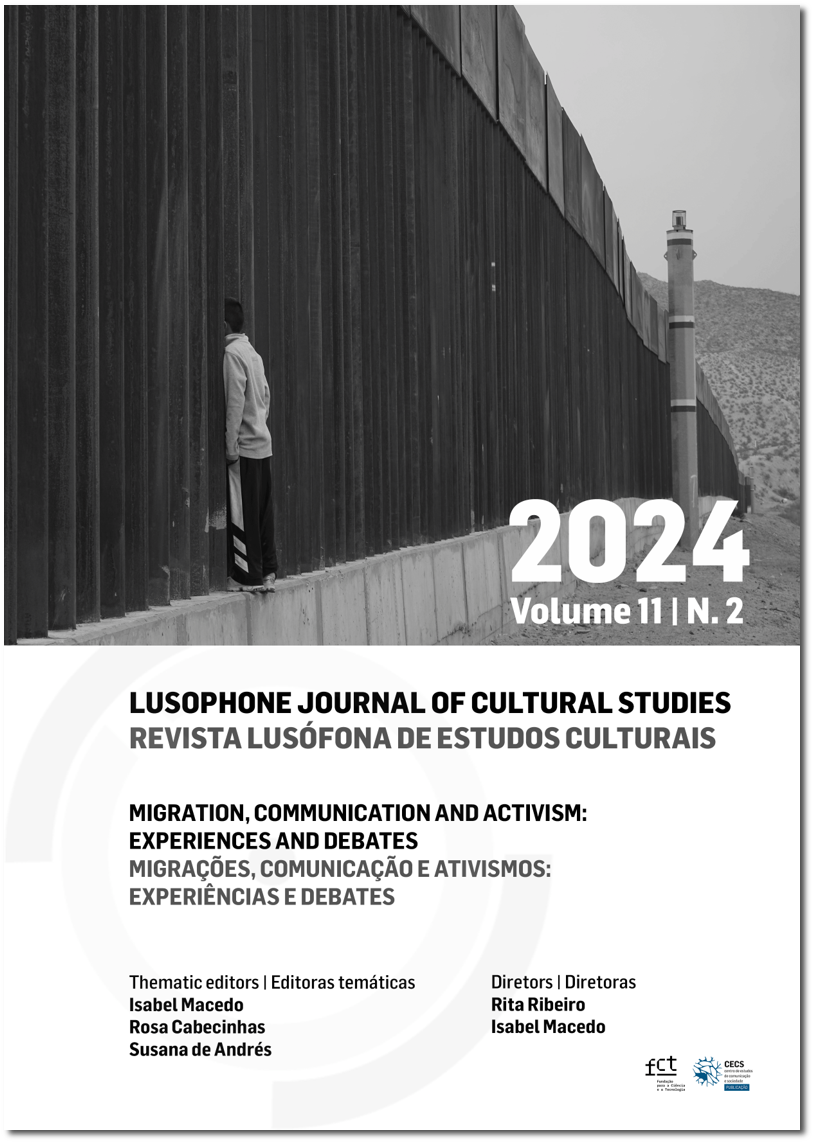Migration, Communication, and Activism: Perspectives and Critical Reflections
DOI:
https://doi.org/10.21814/rlec.6095Downloads
References
Amelung, N. (2021). “Crimmigration control” across borders: The convergence of migration and crime control through transnational biometric databases. Historical Social Research, 46(3), 151–177.
Babo, I. (2023). Activismos, redes e práticas comunicacionais. Documenta.
Bethencourt, F. (2023) Direitos humanos. Fundação Francisco Manuel dos Santos.
Bhabha, H. K. (1994). The location of culture. Routledge.
Cabecinhas, R. (2022). Outras histórias. Ativismos mnemónicos, género e interseccionalidades. In M. Ledo-Andión, M. Pérez-Pereiro, S. Roca-Baamonde, & M.S. Barreiro-González (Eds.), CO(M)XÉNERO. Cadernos de Comunicación e Xénero, 2 (pp. 15–35). Vía Láctea.
Cabecinhas, R., & Macedo, I. (2019). (Anti)racismo, ciência e educação: Teorias, políticas e práticas. Medi@ções, 7(2), 16–36.
Chakrabarty, D. (2020). The climate of history in a planetary age. University of Chicago.
Chakravartty, P., Kuo, R., Grubbs, V., & McIlwain, C. (2018) #CommunicationSoWhite, Journal of Communication, 68(2), 254–266, https://doi.org/10.1093/joc/jqy003
Chaparro, M., & de Andrés, S. (2022). Comunicación radical. Despatriarcalizar, decolonizar y ecologizar la cultura mediática. Gedisa Editorial.
Collado, R., de Andrés, S., Martín-Gómez de Carvallo F., & Bezerra, R. M. (2024). Representación mediática de la migración. Mapas y análisis bibliométrico de la producción científica en torno al tema. Estudios sobre el Mensaje Periodístico, 30(2), 411–423. https://doi.org/10.5209/esmp.95389
Curran, J., & Park, M.-J. (2000). De-westernizing media studies. Routledge.
Davis, A. (2022, 10 de outubro). Imigração, racismo e resistência [Vídeo]. Youtube. https://www.youtube.com/watch?v=DrS-FhXeKdU
Fanon, F. (1952). Peau noire, masques blancs. Éditions du Seuil.
Figueiredo, A., Oldenhove, G., & Licata, L. (2018). Collective memories of colonialism and acculturation dynamics among Congolese immigrants living in Belgium. International Journal of Intercultural Relations, 62, 80–92. https://doi.org/10.1016/j.ijintrel.2017.03.004
Glissant, E. (2005). Introdução a uma poética da diversidade. Editora UFJF.
Hall, S. (1996). When was the postcolonial? Thinking at the limit. In I. Chambers & L. Curti (Eds.), The postcolonial question (pp. 242–260). Routledge.
Jenkins, H., Shresthova, S., Gamber-Thompson, L., Kligler-Vilenchik, N., & Zimmerman, A. (2016). Youth voice, media, and political engagement. Introducing the core concepts. In H. Jenkins, S. Shresthova, L. Gamber-Thompson, N. Kligler-Vilenchik & A. Zimmerman (Eds.), By any media necessary. The New Youth Activism (pp. 1–60). New York University Press. https://doi.org/10.18574/nyu/9781479829712.003.0004
Khan, S., Can, N., & Machado, H. (2022). Racism and racial surveillance. Modernity matters. Routledge.
Macedo, I., Balbé, A., & Cabecinhas, R. (2023). Cultura visual, educação e comunicação intercultural: Grupos de discussão com estudantes no ensino secundário português. Educação Em Foco, 26(48) . https://doi.org/10.36704/eef.v26i48.7145
Maldonato-Torres, N. (2008). A topologia do ser e a geopolítica do conhecimento. Modernidade, império e colonialidade. Revista Crítica de Ciências Sociais, 80, 71–114.
Mattelart, T. (2019). Media, communication technologies and forced migration: Promises and pitfalls of an emerging research field. European Journal of Communication, 34(6), 582–593.https://doi.org/10.1177/0267323119886146
Mbembe, J. A. (2013). Critique de la raison nègre. Éditions La Découverte.
McAuliffe, M., & L.A. Oucho (Eds.) (2024). World migration report 2024. International Organization for Migration.
McDougall, J., Brites, M. J., Couto, M. J., & Lucas, C. (2019). Digital literacy, fake news and education/Alfabetización digital, fake news y educación. Culture and Education, 31(2), 203–212. https://doi.org/10.1080/11356405.2019.1603632
Mignolo, W. D. (2017). Coloniality is far from over, and so must be decoloniality. Afterall: A Journal of Art, Context and Enquiry, 43, 38–45. https://doi.org/10.1086/692552
Mignolo, W. D., & Walsh, C. E. (2018). On decoloniality: Concepts, analytics, praxis. Duke University Press.
Mirzoeff, N., & Halberstam, J. (2018). Decolonize media: Tactics, manifestos, histories. Journal of Cinema and Media Studies, 57(4), 120–123.
Monteiro, J. P. (2020). From ‘Natives’ to ‘Aborigines’: Late colonialism, Indigenous rights and the global politics of sovereignty (1953–1962). The Journal of Imperial and Commonwealth History, 48(5), 1–24.
Moyo, L. (2020). The decolonial turn in media studies in Africa and the Global South. Palgrave.
Pereira, A. C., Correia Borges, G., & Lança, M. (2024). Nota de abertura: Reparar (n)o Irreparável. Vista, (13), e024010. https://doi.org/10.21814/vista.5813
Pereira, S., Brandão, D., & Pinto, M. (2021). bYou: A research proposal about and with children and youngsters as creative agents of change through the use of the media. In D. Raposo, N. Martins, & D. Brandão (Eds.), advances in human dynamics for the development of contemporary societies. AHFE 2021. Lecture notes in networks and systems (Vol. 277, pp. 95–103). Springer. https://doi.org/10.1007/978-3-030-80415-2_12
Pickard, V., & Yang G. (2017). Media activism in the digital age. Routledge.
Quijano, A. (2007). Coloniality and modernity/rationality. Cultural Studies, 21(2–3), 168–178. https://doi.org/10.1080/09502380601164353
Roldão, C., Pereira, J. A., & Varela, P. (2023). Tribuna negra: Origens do movimento negro em Portugal (1911–1933). Tinta da China.
Said, E. (1978). Orientalism. Pantheon Books.
Sousa, V., Khan, S., & Pereira, P. S. (2022). A restituição cultural como dever de memória. Comunicação e Sociedade, 41, 11–22. https://doi.org/10.17231/comsoc.41(2022).4039
Spivak, G. C. (1988). Can the subaltern speak?. In C. Nelson & L. Grossberg (Eds.), Marxism and the interpretation of culture (pp. 271–313). Macmillan.
Downloads
Published
How to Cite
Issue
Section
License
Copyright (c) 2024 Isabel Macedo, Rosa Cabecinhas, Susana de Andrés

This work is licensed under a Creative Commons Attribution 4.0 International License.
Authors own the copyright, providing the journal with the right of first publication. The work is licensed under a Creative Commons - Atribuição 4.0 Internacional License.












